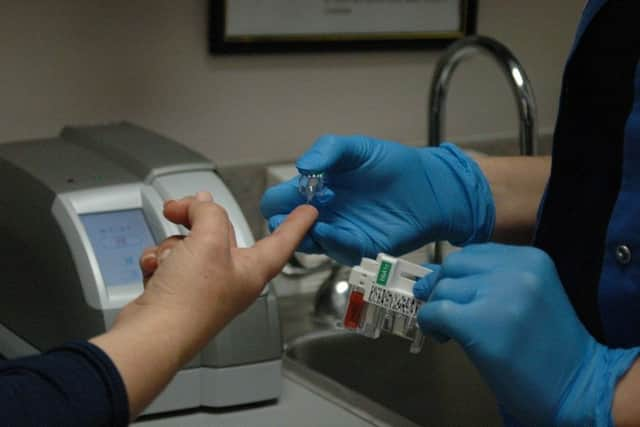'˜Blame just doesn't belong in the conversation' : diabetes consultant


Dr. Black has been a Consultant Diabetes and Endocrinology Physician with the Western Health and Social Care Trust since 2009 and works with hundreds of patients every year locally.
There are around 11,500 people in the Western Trust area known to have Type 2 Diabetes and a further 1,500 with Type 1 Diabetes.
Advertisement
Hide AdAdvertisement
Hide AdDr Black has trained and worked across Northern Ireland before taking up his post with the Western Trust. He has also just been appointed the Trust’s Assistant Director for Acute Services and is set to take on his new role in the New Year.


With family ties to South Derry and Tyrone and previous experience of working locally, Dr Black was no stranger to the western region before taking up a permanent post here, especially as his wife, who also works at Altnagelvin Hospital, comes from the same area.
He said personal experiences during his junior doctor training counted for a lot in determining his future speciality, especially working with “inspiring” individuals.
“I really enjoyed dealing with people I would be treating and I enjoyed that longer term relationship with the people we were looking after,” he said.
Advertisement
Hide AdAdvertisement
Hide AdDr. Neil said that while working together with dieticians, doctors and nurses locally he was impressed by the cohesiveness and how supportive they were of each other.


He said that a large part of the satisfaction he gets from his job lies in working with local people and also from helping people once they are diagnosed with a condition.
He said that “blame doesn’t belong in the conversation at all” when looking at why someone has diabetes.
“The prevalence of diabetes is roughly 5-6 per cent. 90 per cent will have Type 2, which means a person is making enough insulin, but the body is resistant to it.”
Advertisement
Hide AdAdvertisement
Hide AdDr. Black said while inactivity and lifestyle were factors if a parent has Type 2 diabetes the risk to their children is around 50 per cent.
Lifestyle measures such as careful diet and keeping active can halve that risk or hold diabetes back by several years.
He said that the key, however, was not to “boom and bust.”
“Moderation is more important; making meaningful changes; reducing portion size; reducing snacks; getting rid of sugary drinks; increasing physical activity; parking the car a bit further away.
“It has to be realistic things you build on. You know someone at risk can more than half that risk maybe by as little as 5-10% weight loss.”
Advertisement
Hide AdAdvertisement
Hide AdType 1 diabetes meanwhile is genetically pre-determined. The symptoms for Type 1 will present in children or adults within days or weeks via the ‘4Ts’: Tiredness, Thinner, Toilet More Often and Thirsty, and medical attention should be sought immediately. People with Type 1 take life-sustaining hormone insulin, usually via injection.
While Type 2 is much less common in children, there are some locally with it. About one in three people with Type 2 will need insulin initially and more than 90% will require treatment via tablets/injections, with the majority also getting lifestyle advice.
Some GPs will test people for Type 2 if a person thinks they are at risk and the simple blood test can deliver results quickly.
Dr Black said patients, when diagnosed, were often worried about potential complications such as blindness, kidney failure, dialysis, and amputation.
Advertisement
Hide AdAdvertisement
Hide Ad“In recent years we have seen a decrease in the number of people needing dialysis or amputation,” he said.
“Stopping smoking, reducing blood pressure and cholesterol can reduce these risks.”
A much more prevalent complication, however, is heart disease and conditions associated with heart disease.
“We want people to come forward earlier and get checked. I often say that people getting a diagnosis is good because we know now they are at greater risk so they are a lot safer now than they were a few weeks ago. We are about empowering people with diabetes to look after themselves.”
Advertisement
Hide AdAdvertisement
Hide AdDr. Black said that the great thing about working in the Western Trust is the opportunities that exist to take on new roles, the good relationships within and between medical teams as well as the bonds built with patients.
On this latter point, he said being a good physician entails much more than the medical know how.
“Understanding what tests to do, how to interpret the tests, making sure you have a diagnosis and treatment is one thing. Being able to communicate that appropriately and clearly and being attentive to people’s needs can help you treat them much better.
“It is not just about the technicalities, it’s about communication.
Advertisement
Hide AdAdvertisement
Hide Ad“A doctor needs to be a good listener and understand what someone is worried about.
“You need to give people an opportunity to talk.
“People give us a lot of the answers whenever you listen properly.”